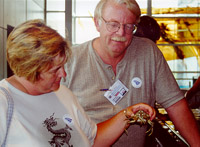S.C., Ga. schoolteachers probe environmental risks
by Ragan DuBose LuskEnvironmental Biosciences Program
Educators are beginning to recognize the value of environmental education as a way to protect the health of future generations, but few teachers have the opportunity to focus on ways to incorporate environmental education into their classrooms.
An institute sponsored by the Environmental Biosciences Program at MUSC gives teachers that chance.
 Teachers
involved in the Teachers’ Environmental Education Institute get hands-on
training.
Teachers
involved in the Teachers’ Environmental Education Institute get hands-on
training.
The Teachers’ Environmental Education Institute (TEEI) brings together middle and high school teachers from South Carolina and Georgia, as well as a handful of Native American educators, to explore environmental issues, develop curriculum using environmental themes and receive resources transferable to their classrooms.
This year’s institute, which ran from July 9 through 21 featured expert speakers, hands-on activities and field trips to the South Carolina Aquarium, Sewee Visitor Center, South Carolina Center for Birds of Prey, Mount Pleasant Waterworks and the Savannah River Environmental Sciences Field Station.
“Our goal is to provide teachers with a broad framework to use in investigating, understanding and teaching environmental risk issues to their students,” said David Rivers of MUSC’s Environmental Biosciences Program. “Participating teachers will be exposed to new skills and approaches which will enable them to introduce, discuss and act on environmental issues with their students and as leaders in their communities.”
 Teachers
making an observation are from left: Clara Williams, Janie Wright and Lillie
Smith.
Teachers
making an observation are from left: Clara Williams, Janie Wright and Lillie
Smith.
Past participants use information learned at the institute to start student-run recycling programs, test home and community water systems for nutrients and pollutants and determine pollution sources in aquatic environments. The type and amount of information the teachers receive gives them a solid knowledge base from which they can expand their students’ environmental awareness.
“I have learned more relevant information during this brief two-week period than in several college courses,” said a teacher participating in the institute.
MUSC, South Carolina State University and the U.S. Department of Energy
offer the TEEI free of charge to participants. Participants who attend
course sessions and complete course-related assignments receive three graduate
credit hours from MUSC.